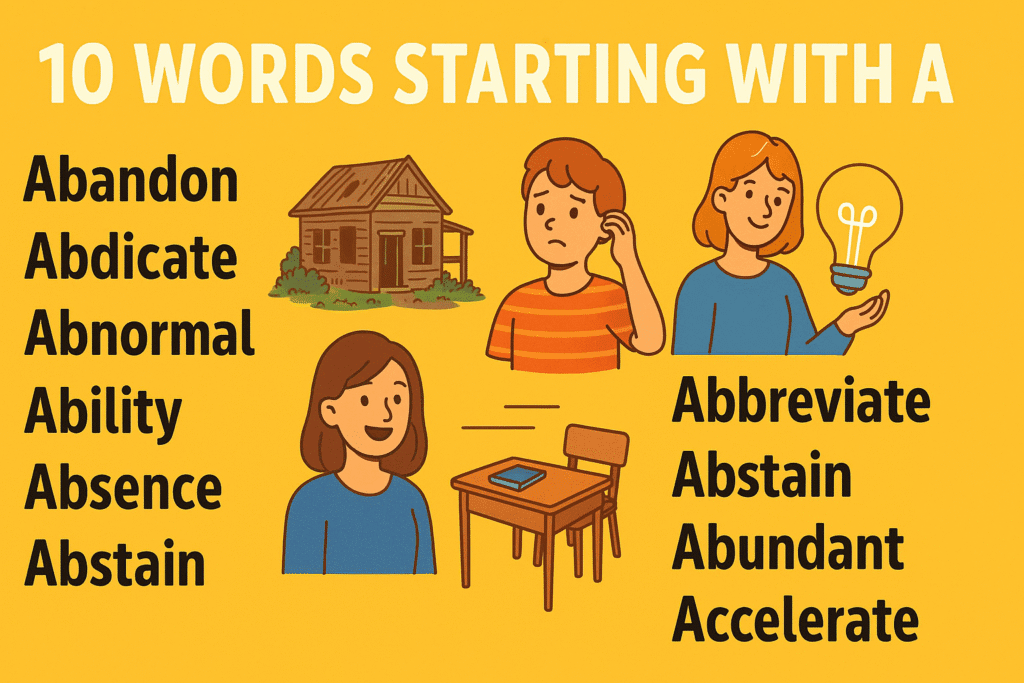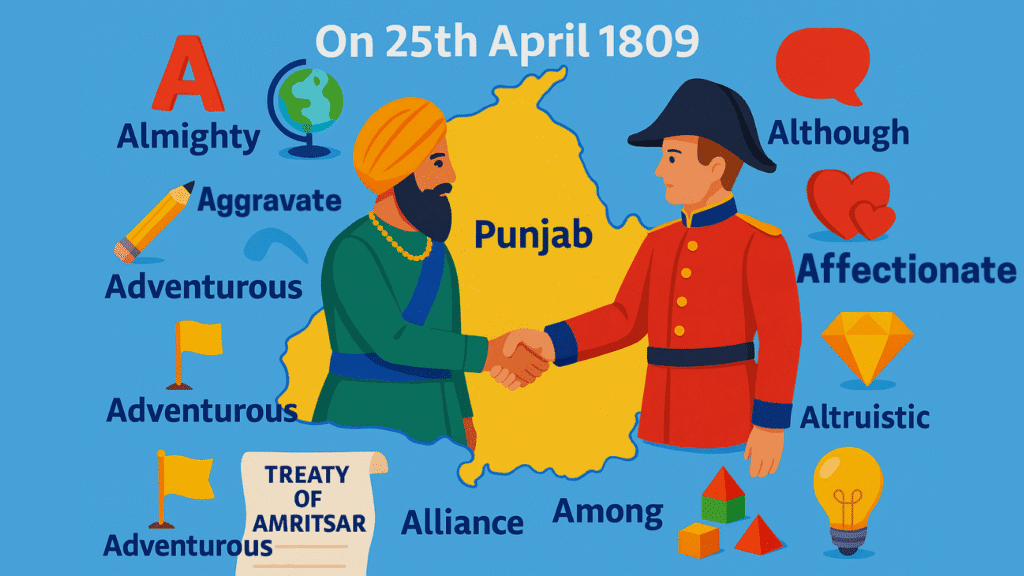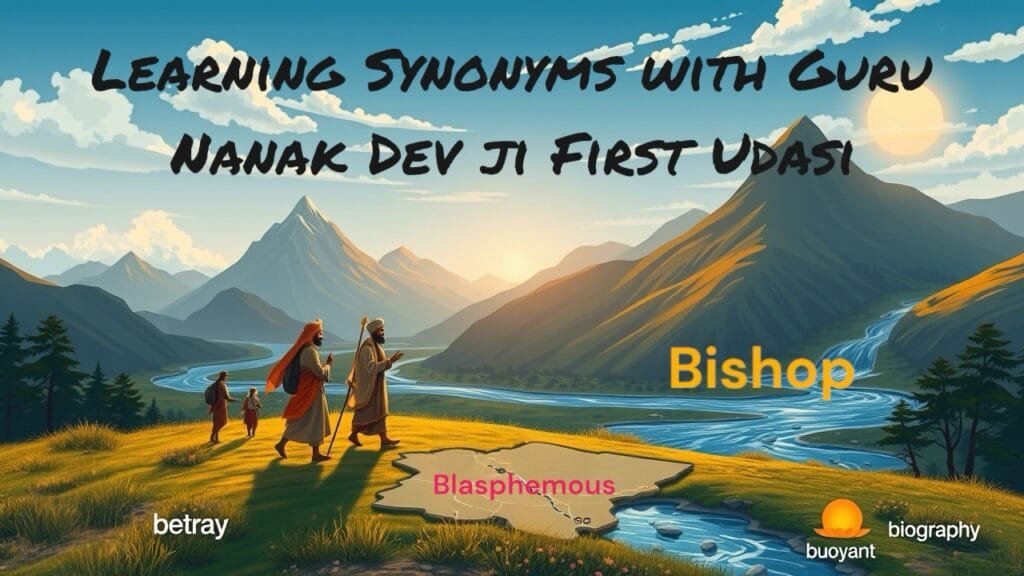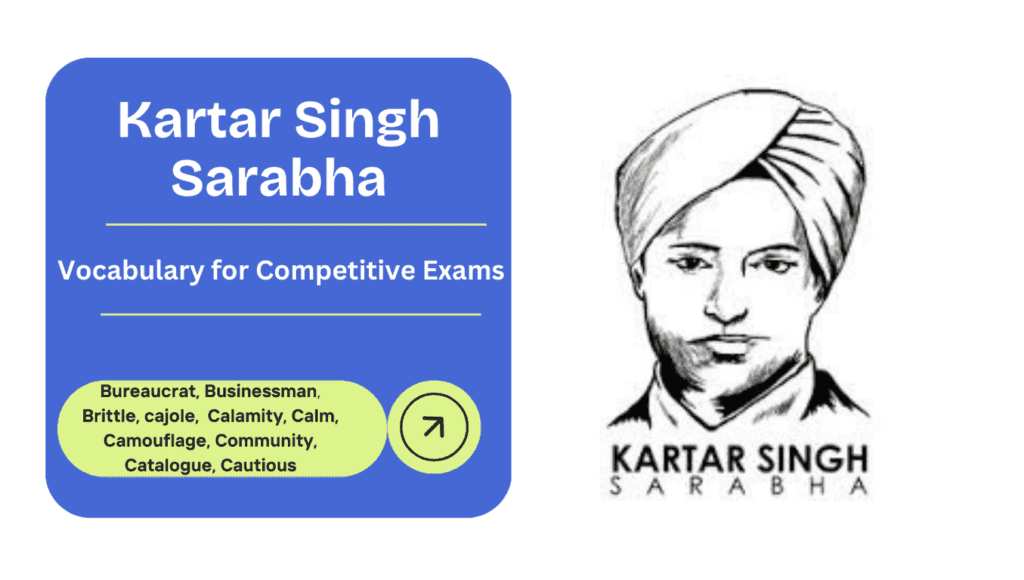
This article is part of our ongoing Vocabulary Learning Series, where we introduce an innovative method of learning words through captivating stories. This is the 8th article in the series, designed to help you expand your vocabulary while enjoying inspiring narratives. If you haven’t yet explored Articles 1–7 of this series, we encourage you to scroll down and read them as well to enhance your learning journey.
Let’s Begin with the Inspiring Story of a Great Hero of the Indian Independence Movement – A Teenage Martyr Who Inspired Millions
Table of Contents
Kartar Singh Sarabha: A Story of Courage and Inspiration
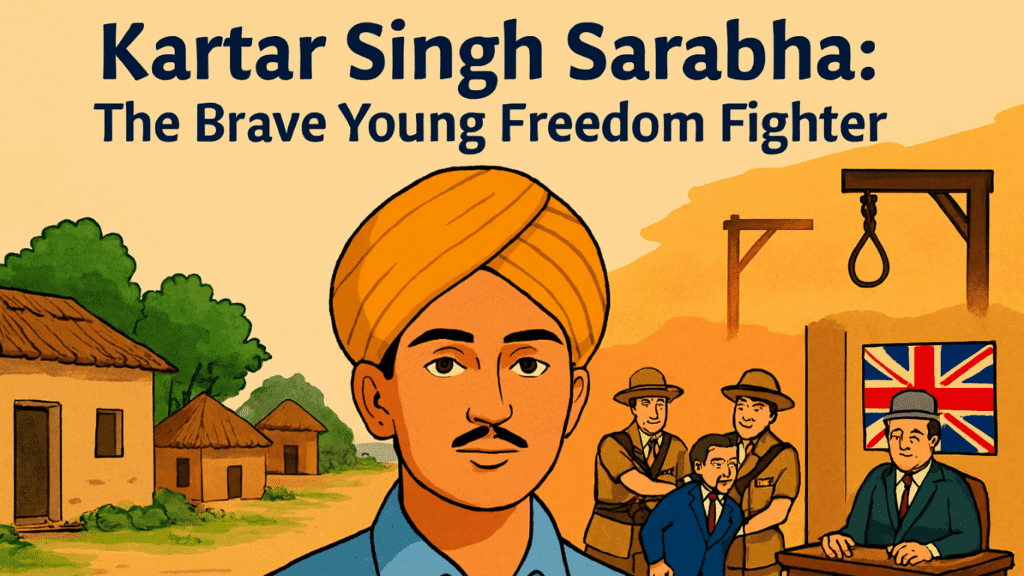
Once upon a time, in a small village named Sarabha in Punjab, India, there lived a young boy named Kartar Singh Sarabha . He was born on May 24, 1896, into a humble farming family. From his childhood, Kartar showed great determination and bravery. Even as a child, he was not brittle (easily broken or weak)—he never gave up easily when faced with challenges.
When Kartar grew older, he went to America to study. However, instead of just focusing on becoming a rich businessman (a person engaged in commerce or trade), he started thinking about how India could be free from British rule. At that time, many Indians living abroad were treated unfairly by the British government. This made Kartar very upset, and he decided to fight for justice.
In America, Kartar joined an organization called the Ghadar Party, which aimed to end British control over India. The members of this group worked hard to spread awareness among Indians about their rights. They created newspapers and catalogues (a complete list of items) to share ideas and inspire others to join the freedom struggle. But they had to use camouflage (disguise or concealment) to hide their true intentions so that the British spies wouldn’t catch them.
Kartar was known for his ability to cajole (persuade someone gently) people into supporting the cause without being rude or pushy. His calm nature won him many friends, but he was also cautious (careful to avoid danger) because he knew the risks involved. Despite the danger, Kartar continued working tirelessly for India’s independence.
Unfortunately, one day, a calamity (a disastrous event) struck. The British authorities found out about the Ghadar Party’s plans and arrested Kartar along with other leaders. During his trial, Kartar remained fearless and spoke boldly about his dreams for a free India. Even though he was only 19 years old, his words inspired thousands of people across the world.
The British bureaucrat (an official working in a government department) who sentenced Kartar to death thought it would silence the movement. But little did they know, Kartar’s sacrifice would ignite a flame of patriotism in the hearts of future generations. On November 16, 1915, Kartar Singh Sarabha was hanged. Yet, his courage became a symbol of hope for the entire community (a group of people living together).
Today, Kartar Singh Sarabha is remembered as a hero who gave everything for his country. His life teaches us that no matter how young we are, we can make a difference if we have courage and determination. Let his story inspire you to work hard, stay calm (peaceful and composed) under pressure, and always stand up for what is right.
In this article, we will learn 10 very important words that frequently appear in many competitive exams such as PCS, PSSSB, Patwari, Punjab Police, Excise Inspector, Senior Assistant, Labour Inspector, and other related exams like SSC, CGL, CPO, CHSL, etc. Let’s begin by understanding the meanings of these words in both English and Punjabi, along with example sentences to help you grasp their usage effectively.
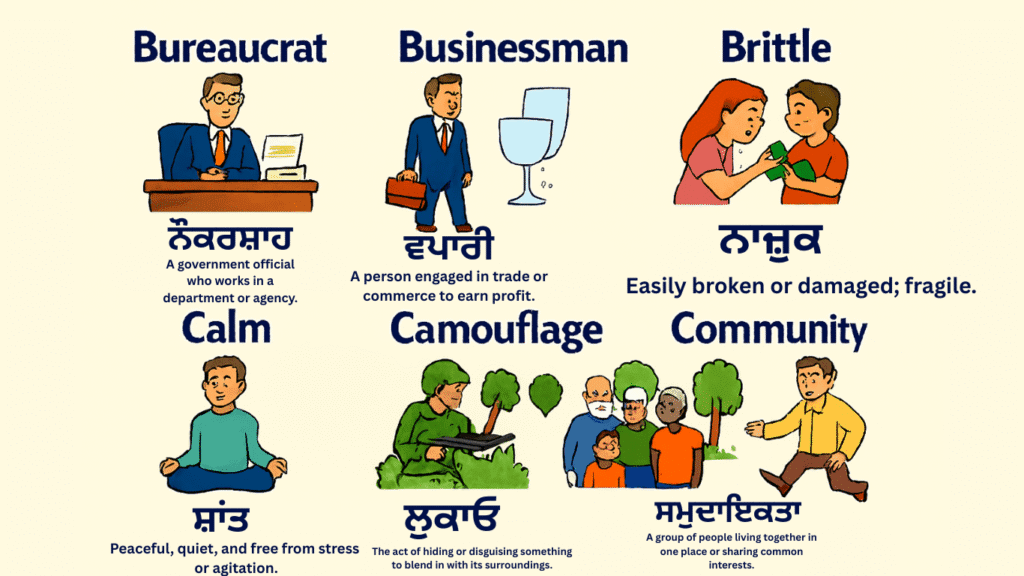
1. Bureaucrat
- Meaning (English): A government official who works in a department or agency.
- Meaning (Punjabi): ਨੌਕਰਸ਼ਾਹ (Naukarshaah)
- Sentence: The bureaucrat ensured that all the rules were followed during the project.
- ਵਾਕ: ਉਸ ਨੌਕਰਸ਼ਾਹ ਨੇ ਪ੍ਰੋਜੈਕਟ ਦੌਰਾਨ ਸਾਰੇ ਨਿਯਮਾਂ ਦੀ ਪਾਲਣਾ ਯਕੀਨੀ ਬਣਾਈ।
2. Businessman
- Meaning (English): A person engaged in trade or commerce to earn profit.
- Meaning (Punjabi): ਵਪਾਰੀ (Vyapari)
- Sentence: The businessman invested heavily in new technology to grow his company.
- ਵਾਕ: ਉਸ ਵਪਾਰੀ ਨੇ ਆਪਣੀ ਕੰਪਨੀ ਨੂੰ ਵਧਾਉਣ ਲਈ ਨਵੀਂ ਤਕਨੀਕ ਵਿੱਚ ਭਾਰੀ ਨਿਵੇਸ਼ ਕੀਤਾ।
3. Brittle
- Meaning (English): Easily broken or damaged; fragile.
- Meaning (Punjabi): ਨਾਜ਼ੁਕ (Naazuk)
- Sentence: The glass was so brittle that it shattered into pieces when dropped.
- ਵਾਕ: ਗਲਾਸ ਇੰਨਾ ਨਾਜ਼ੁਕ ਸੀ ਕਿ ਜਦੋਂ ਗਿਰਿਆ ਤਾਂ ਟੁਕੜਾਂ ਵਿੱਚ ਫਟ ਗਿਆ।
4. Cajole
- Meaning (English): To persuade someone gently or cleverly to do something.
- Meaning (Punjabi): ਫੁਸਲਾਉਣਾ (Fuslaana)
- Sentence: She tried to cajole her younger brother into sharing his toys with her.
- ਵਾਕ: ਉਸਨੇ ਆਪਣੇ ਛੋਟੇ ਭਰਾ ਨੂੰ ਖਿਡੌਣੇ ਸਾਂਝੀਆਂ ਕਰਨ ਲਈ ਫੁਸਲਾਉਣ ਦੀ ਕੋਸ਼ਿਸ਼ ਕੀਤੀ।
5. Calamity
- Meaning (English): A disastrous event causing great suffering or damage.
- Meaning (Punjabi): ਆਫਤ (Aaft)
- Sentence: The earthquake was a major calamity that affected thousands of lives.
- ਵਾਕ: ਭੂਚਾਲ ਇੱਕ ਵੱਡੀ ਆਫਤ ਸੀ ਜਿਸ ਨਾਲ ਹਜ਼ਾਰਾਂ ਲੋਕ ਪ੍ਰਭਾਵਿਤ ਹੋਏ।
6. Calm
- Meaning (English): Peaceful, quiet, and free from stress or agitation.
- Meaning (Punjabi): ਸ਼ਾਂਤ (Shaant)
- Sentence: Despite the chaos around him, he remained calm and focused on the task.
- ਵਾਕ: ਆਪਣੇ ਚਾਰੇ ਪਾਸੇ ਅਸ਼ਾਂਤੀ ਹੋਣ ਦੇ ਬਾਵਜੂਦ, ਉਹ ਸ਼ਾਂਤ ਰਹਿਣ ਅਤੇ ਕੰਮ ‘ਤੇ ਧਿਆਨ ਕੇਂਦਰਿਤ ਕਰਨ ਵਿੱਚ ਕਾਮਯਾਬ ਰਿਹਾ।
7. Camouflage
- Meaning (English): The act of hiding or disguising something to blend in with its surroundings.
- Meaning (Punjabi): ਲੁਕਾਓ (Lukaao)
- Sentence: Soldiers used camouflage to avoid being detected by the enemy.
- ਵਾਕ: ਸੈਨਿਕਾਂ ਨੇ ਦੁਸ਼ਮਨ ਦੁਆਰਾ ਪਤਾ ਲਗਾਏ ਜਾਣ ਤੋਂ ਬਚਣ ਲਈ ਲੁਕਾਓ ਦੀ ਵਰਤੋਂ ਕੀਤੀ।
8. Community
- Meaning (English): A group of people living together in one place or sharing common interests.
- Meaning (Punjabi): ਸਮੁਦਾਇਕਤਾ (Samudaayiktaa)
- Sentence: The local community came together to clean the park.
- ਵਾਕ: ਸਥਾਨਕ ਸਮੁਦਾਇਕਤਾ ਨੇ ਮਿਲਕੇ ਪਾਰਕ ਨੂੰ ਸਾਫ਼ ਕੀਤਾ।
9. Catalogue
- Meaning (English): A complete list of items, usually arranged systematically.
- Meaning (Punjabi): ਸੂਚੀ (Soochee)
- Sentence: She prepared a detailed catalogue of all the books in the library.
- ਵਾਕ: ਉਸਨੇ ਲਾਇਬ੍ਰੇਰੀ ਵਿੱਚ ਮੌਜੂਦ ਸਾਰੀਆਂ ਕਿਤਾਬਾਂ ਦੀ ਵਿਸਤ੍ਰਿਤ ਸੂਚੀ ਤਿਆਰ ਕੀਤੀ।
10. Cautious
- Meaning (English): Careful to avoid potential problems or dangers.
- Meaning (Punjabi): ਸਾਵਧਾਨ (Saavadhaan)
- Sentence: He was cautious while crossing the busy road.
- ਵਾਕ: ਉਹ ਵਿਅਸਤ ਸੜਕ ਪਾਰ ਕਰਦੇ ਸਮੇਂ ਸਾਵਧਾਨ ਸੀ।
Why Learn These Words?
These words are not only essential for competitive exams but also help improve your communication skills. By learning their meanings in both English and Punjabi, you can better understand their usage in different contexts. Additionally, practicing them through example sentences ensures that you remember them for longer.
Stay tuned for more articles in our Vocabulary Learning Series, where we make language learning engaging and meaningful through inspiring stories and practical examples!
Practice Paragraph: Test Your Understanding
Now that you’ve learned the meanings of these 10 important words in both English and Punjabi, it’s time to put your knowledge into practice! Below is a short paragraph where you can use these words to complete the sentences. This exercise will help reinforce your understanding and improve your vocabulary retention.
Fill in the blanks with the correct words from the list: Bureaucrat, Businessman, Brittle, Cajole, Calamity, Calm, Camouflage, Community, Catalogue, Cautious.
- During the heavy rains, the old bridge became so __________ that it collapsed under the pressure.
- The __________ worked tirelessly to ensure that relief supplies reached everyone affected by the flood, which was a major __________.
- A __________ donated a large sum of money to rebuild the school destroyed by the storm.
- The soldier used __________ to blend into the forest while on a secret mission.
- Despite the chaos at the train station, she remained __________ and helped her grandmother board safely.
- The teacher asked the students to prepare a __________ of all the books they had read during the semester.
- He was very __________ while walking on the icy road to avoid slipping and falling.
- She tried to __________ her friend into lending her the book for just one more day.
- The entire __________ came together to celebrate the festival with great enthusiasm.
- The strict __________ ensured that all government policies were implemented without delay.
Practice Makes Perfect!
We’d love to hear how you’re progressing! Please write your answers to the above practice paragraph in the comment box below . Feel free to share any additional sentences you create using these words—we’d be thrilled to see your creativity!
If you found this article helpful, don’t forget to share it with your friends who are also preparing for competitive exams. Together, let’s make learning fun and impactful!
Stay tuned for our next article in the Vocabulary Learning Series, where we’ll explore more words through inspiring stories and practical examples. Keep practicing, and remember: small efforts every day lead to big results!
If you’re finding this series helpful but feel like you need more context or examples, don’t forget to click on the links to Articles 1–7 in our Vocabulary Learning Series. These articles will give you a deeper understanding of how we’re blending storytelling with vocabulary building to make learning both engaging and effective.
5th Part Words That Win! The Ultimate Synonym Guide for competitive exams
4th Part Boost Your Vocabulary with the Inspiring Story of Khalsa Creation
3rd Part Boost Your Vocabulary with Maharaja Ranjit Singh’s Courageous Story
2nd Part Master Synonyms for Competitive Exams: Boost Your Vocabulary with a beautiful story
1st Part Synonyms for your exams with a perfect way to remember them
Frequently Asked Questions (FAQs)
1. Who are called bureaucrats?
Bureaucrats are government officials who work in various administrative departments or agencies. They implement policies, manage public resources, and ensure the smooth functioning of government operations. Unlike elected officials, bureaucrats are typically hired based on qualifications and experience rather than through elections. Their role is to serve the public by executing laws and regulations impartially and efficiently.
2. Who are called businessmen?
Businessmen are individuals who engage in commercial or professional activities to earn profit. They may own, manage, or invest in businesses, ranging from small shops to large corporations. A businessman’s role often involves decision-making, risk-taking, and strategic planning to ensure the growth and success of their enterprise. Unlike employees, businessmen typically have a stake in the ownership or management of the business.
3. What do you mean by brittle?
“Brittle” refers to something that is easily broken, damaged, or fragile. It lacks flexibility and tends to crack or shatter under pressure. For example, brittle materials like glass or dry wood break easily when subjected to stress. The term can also describe a person or situation that is emotionally weak or vulnerable.
4. What does cajole mean?
“Cajole” means to persuade someone gently, often through flattery or coaxing, to do something. It involves using clever or subtle tactics to convince a person to agree with you or follow your suggestion. For example, a child might cajole their parents into letting them stay up late by being sweet and persistent.
5. What is the meaning of calm?
“Calm” refers to a state of peace, quiet, and composure, especially in situations that may be stressful or chaotic. It describes someone who remains relaxed, steady, and free from agitation or excitement. For example, a calm person stays level-headed during a crisis, while a calm sea has no waves or disturbances.
6. What is camouflage in simple words?
Camouflage is the act of hiding or blending something into its surroundings to make it difficult to see. It is often used by animals, soldiers, or hunters to avoid being noticed. For example, a chameleon changes its color to match the environment, and soldiers wear uniforms that help them blend into the forest.
7. What do you mean by community?
A community is a group of people who live in the same area or share common interests, goals, or characteristics. It can refer to a local neighborhood, a cultural group, or even an online network. Members of a community often work together, support one another, and participate in shared activities or events.
8. What does calamity mean?
A calamity is a disastrous event that causes great harm, suffering, or damage. It often refers to natural disasters like earthquakes, floods, or storms, but it can also describe any serious misfortune or tragedy. For example, a severe drought that destroys crops and affects livelihoods is considered a calamity.
9. What is called a catalog?
A catalog is a complete list or collection of items, usually arranged in a specific order, such as alphabetical or numerical. It provides detailed information about the items, making it easier to find or reference them. For example, a library catalog lists all the books available, while a product catalog displays items for sale with descriptions and prices.
10. What does it mean to be cautious?
To be cautious means to be careful and watchful, especially in situations where there might be risks or dangers. A cautious person thinks ahead, avoids unnecessary risks, and takes steps to prevent problems. For example, a cautious driver slows down in bad weather to stay safe.

